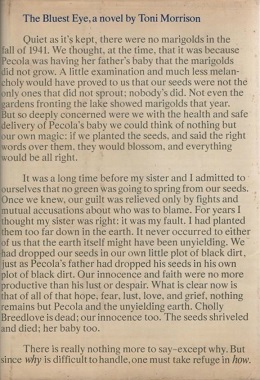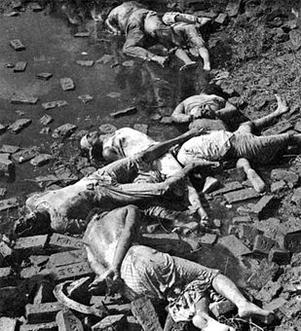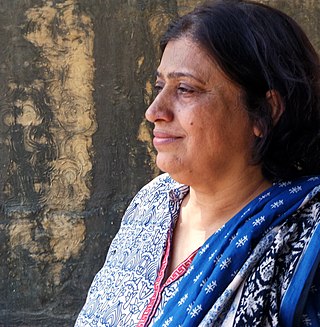
Taslima Nasrin is a Bangladeshi-Swedish writer, physician, feminist, secular humanist, and activist. She is known for her writing on women's oppression and criticism of religion; some of her books are banned in Bangladesh. She has also been blacklisted and banished from the Bengal region, both from Bangladesh and the Indian state of West Bengal.

I Know Why the Caged Bird Sings is a 1969 autobiography describing the young and early years of American writer and poet Maya Angelou. The first in a seven-volume series, it is a coming-of-age story that illustrates how strength of character and a love of literature can help overcome racism and trauma. The book begins when three-year-old Maya and her older brother are sent to Stamps, Arkansas, to live with their grandmother and ends when Maya becomes a mother at the age of 16. In the course of Caged Bird, Maya transforms from a victim of racism with an inferiority complex into a self-possessed, dignified young woman capable of responding to prejudice.

The Bluest Eye, published in 1970, is the first novel written by Toni Morrison. The novel takes place in Lorain, Ohio, and tells the story of a young African-American girl named Pecola who grew up following the Great Depression. Set in 1941, the story is about how she is consistently regarded as "ugly" due to her mannerisms and dark skin. As a result, she develops an inferiority complex, which fuels her desire for the blue eyes she equates with "whiteness".

Hinduism is the second largest religious affiliation in People's Republic of Bangladesh, as according to the 2022 Census of Bangladesh, approximately 13.1 million people responded that they were Hindus, constituting 7.95% out of the total population of 165.15 million people. In terms of population, Bangladesh is the third-largest Hindu populated country of the world, just after the neighboring republics of India and Nepal in the subcontinent. Hinduism is the second-largest religion in 61 out of 64 districts of Bangladesh, but there is no Hindu majority district in Bangladesh.

Lajja (Shame) is a novel in Bengali by Taslima Nasrin, a writer of Bangladesh. The word lajja/lôjja means "shame" in Bengali and many other Indo-Aryan languages. The book was first published in 1993 in Bengali and was subsequently banned in Bangladesh. It nonetheless sold 50,000 copies in the six months after its publication, though Taslima fled her native Bangladesh after receiving death threats from Islamic groups.

Neelima Ibrahim was a Bangladeshi educationist, littérateur and social worker. She is well known for her scholarship on Bengali literature but even more so for her depiction of raped and tortured women in the 1971 Bangladesh Liberation War in her book Ami Birangana Bolchi. She was awarded Bangla Academy Literary Award in 1969, Begum Rokeya Padak in 1996 and Ekushey Padak in 2000 by the Government of Bangladesh for her contributions to Bangla literature.
Koren Zailckas is an American writer and memoirist. Her debut, Smashed: Story of a Drunken Girlhood, was released in 2005 by Viking Penguin and became a New York Times bestseller. Zailckas attended Nashoba Regional High School in Bolton, Massachusetts, Syracuse University and Bennington College. She is a 2014 recipient of the Alex Awards.

The Bangladesh genocide, also known as the Gonohotta, was the genocide of Bengalis of East Pakistan during the Bangladesh Liberation War. It began on 25 March 1971 with the launch of Operation Searchlight, as the government of Pakistan under Yahya Khan, dominated by West Pakistan, began a military crackdown on East Pakistan to suppress Bengali calls for self-determination. During the nine-month-long war, members of the Pakistan Armed Forces and supporting pro-Pakistani Islamist militias from Jamaat-e-Islami killed between 300,000 and 3,000,000 people and raped between 200,000 and 400,000 Bengali women, in a systematic campaign of genocidal rape. The genocide mainly targeted the Hindu population in East Pakistan, leading to the killing and displacement of a large number of Bengali Hindus from the region. The International Commission of Jurists concluded that the genocide involved the attempt to exterminate or forcibly remove a significant portion of Hindus from the country.

A Golden Age is the first novel of the Bangladesh-born writer Tahmima Anam. It tells the story of the Bangladesh War of Liberation through the eyes of one family. The novel was awarded the prize for Best First Book in the Commonwealth Writers' Prize 2008. It was also shortlisted for the 2007 Guardian First Book Award. The first chapter of the novel appeared in the January 2007 edition of Granta magazine.

The Bangladesh Chhatra League, formerly known as the East Pakistan Student League, often simply called the Chhatra League, is a students' political organisation in Bangladesh, founded by Sheikh Mujibur Rahman on 4 January 1948. BSL is the student wing of the Bangladesh Awami League.

Germaine Greer is an Australian writer and public intellectual, regarded as one of the major voices of the second-wave feminism movement in the latter half of the 20th century.
Nirbachito Column or is a feminist work in Bengali literature. It was published in 1992 and is a collection of essays by exiled Bengali author Taslima Nasrin which were previously published in the newspaper Ajker Kagoj. The author was awarded the Ananda Purashkar, a major Bengali literary award, for the book.
Jabo Na Keno? Jabo is the second column collection of Bangladeshi-born feminist and secular humanist writer Taslima Nasrin.
During the 1971 Bangladesh Liberation War, members of the Pakistani military and Razakar paramilitary force raped between 200,000 and 400,000 Bengali women and girls in a systematic campaign of genocidal rape. Most of the rape victims of the Pakistani Army and its allies were Hindu women. Some of these women died in captivity or committed suicide, while others moved from Bangladesh to India. Imams and Muslim religious leaders declared the women "war booty”. The activists and leaders of Islamic parties are also accused to be involved in the rapes and abduction of women.

Girlhood is a 2014 French coming-of-age drama film written and directed by Céline Sciamma. The plot focuses on the life of Marieme, a teenage girl who lives in a rough neighbourhood on the outskirts of Paris. The film discusses and challenges conceptions of race, gender and class; Sciamma's goal was to capture the stories of Black teenagers, characters she claims are generally underdeveloped in French films.
Attacks by Fundamentalist in Bangladesh refers to a period of turbulence in Bangladesh between 2013 and 2016 where attacks on a number of secularist and atheist writers, bloggers, and publishers in Bangladesh; foreigners; homosexuals; and religious minorities such as Hindus, Buddhists, Christians and Ahmadis were seen as having attacked Islam and the Prophet Muhammad with many killed by Muslim extremists in retaliation. By 2 July 2016 a total of 48 people, including 20 foreign nationals, were killed in such attacks. These attacks were largely blamed on extremist groups such as Ansarullah Bangla Team and Islamic State of Iraq and Syria. The Bangladeshi government was criticized for its response to the attacks, which included charging and jailing some of the secularist bloggers for allegedly defaming some religious groups; or hurting the religious sentiments of different religious groups; or urging the bloggers to flee overseas. This strategy was seen by some as pandering to hard line elements within Bangladesh's Muslim majority population. About 89% of the population in Bangladesh is Sunni Muslim. The government's eventual crackdown in June 2016 was also criticized for its heavy-handedness, as more than 11,000 people were arrested in a little more than a week.
Aalo Aandhari is the autobiography of Baby Halder, a domestic worker who battled poverty, hardship, violence and after a lot of struggle finally managed to make a name for herself as a writer. The book traces Baby's difficult life since she was abandoned by her mother and left with a cruel, abusive father at a very young age. Married at twelve to an abusive man twice her age and a mother at fourteen, her life was marked by overwhelming challenges. Exhausted and desperate, she fled with her three children to Delhi, to work as a maid in some of the city's wealthiest homes. Expected to serve her employers' every demand, she faced a staggering workload that often left her no time to care for her own children.

Mala Sen was a Bengali-Indian-British writer and human rights activist. As an activist, she was known for her civil rights activism and race relations work in London during the 1960s and 1970s, as part of the British Asian and British Black Panthers movements, and later her women's rights activism in India. As a writer, she was known for her book India's Bandit Queen: The True Story of Phoolan Devi, which led to the acclaimed 1994 film Bandit Queen. After researching the oppression of women in rural India, she also published Death by Fire in 2001.

Attiya Dawood is a Sindhi poet, writer, feminist and activist. She was born in Moledino Larik She has been hailed as one of the most important feminist Sindhi writers of her time. Attiya uses her poetry to highlight the oppression of women in Sindhi society in the name of tradition. She has been writing poetry since 1980.
Dwikhandito is an autobiographical book of Bengali novelist and poet Taslima Nasrin, published in 2003. This is the third volume of Amar Meyebela. The book was first published in Bangladesh under the title Ko ("Speak") and banned. It was also banned in the Indian state of West Bengal for two years alleging insult of religious beliefs and obscenity. In March 2018 the book was translated into English and published as Split: A Life by Penguin Random House.












